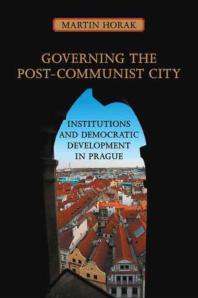

Most ebook files are in PDF format, so you can easily read them using various software such as Foxit Reader or directly on the Google Chrome browser.
Some ebook files are released by publishers in other formats such as .awz, .mobi, .epub, .fb2, etc. You may need to install specific software to read these formats on mobile/PC, such as Calibre.
Please read the tutorial at this link. https://ebooknice.com/page/post?id=faq
We offer FREE conversion to the popular formats you request; however, this may take some time. Therefore, right after payment, please email us, and we will try to provide the service as quickly as possible.
For some exceptional file formats or broken links (if any), please refrain from opening any disputes. Instead, email us first, and we will try to assist within a maximum of 6 hours.
EbookNice Team

Status:
Available5.0
32 reviews
ISBN 10: 1442684380
ISBN 13: 9781442684386
Author: Martin Horak
When faced with the rapid and disorienting transition from communism to democracy, many eastern European leaders sought simple, immediately rewarding answers to complex policy problems. Undoubtedly, this hurried approach had a significant impact on the quality of democratic government in formerly communist countries. Through an analysis of urban politics in Prague between 1990 and 2000, Governing the Post-Communist City sheds new light on the factors that shaped policy in eastern Europe at the time of its democratic transformation.
The first book-length study of post-communist urban politics in a city outside of Russia, Governing the Post-Communist City links the difficulties of democratic government in 1990s Prague to decisions made shortly after the fall of communism. Focusing on the issues of road infrastructure and downtown development, Martin Horak argues that local leadership was more concerned with insulating policy-making processes from public influence than with creating new policies suited to post-communist urban development. This set a precedent for the whole institutional environment of post-communist Prague and entrenched itself in the city’s politics throughout the 1990s.
Original, engaging, and authoritative, this study has much to say about the political climate in Prague after the downfall of communism, and makes insightful conclusions about the factors that contributed to present political circumstances in the region.
1 Introduction
2 The Structure of Government in Prague: Building a Strong Local State
3 Institutions and Political Actors in Early Post-communist Prague
4 Planning and Developing the Main Road Network: The Politics of Mutual Delegitimation
5 Preservation and Development in Prague’s Historic Core: The Politics of Profit
6 Institutional Change and Government Performance: Lessons from Prague
city government books
governing on the ground book
the post commission
governing the commons book
community and the politics of place
a city's governing document is its
Tags: Martin Horak, Governing, Communist